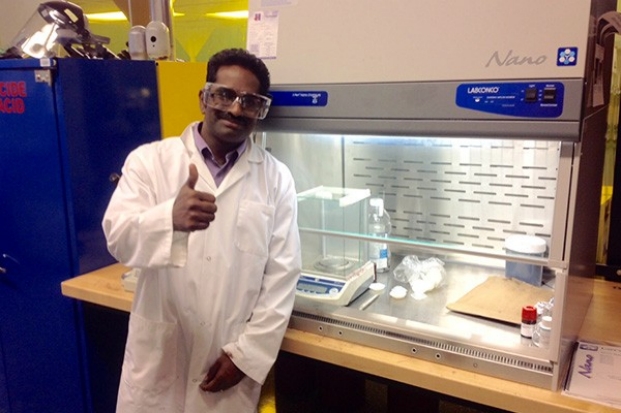Lab safety
Safety is a number one priority in our Engineering Program as supported by University policy VPSS-40. Teaching laboratories are supervised by trained technical staff who also have completed first aid & CPR training.

Laboratory Safety Guidelines
Students are required to follow our laboratory safety guidelines and to be aware of emergency procedures.
We work closely with the Environmental Health and Safety office (EH&S). Any student who has a question regarding safety can contact the department safety officer or EH&S for assistance.
Every project requires attention and the prioritization of safety principles, training required, hazard identification, risk analysis and hazard mitigation.
The department safety committee comprised of of faculty, students and staff meet regularly to discuss safety and training.
Safety Training Events
Consult this calendar of safety training events encompassing chemical handling, hazardous materials, corrosives, lasers, radioactive materials.
IN CASE OF AN EMERGENCY CALL 3717
- First discuss your experiment regarding possible hazards or problems, with your professor, the engineering laboratory demonstrator, or the MIE technical staff.
- Do not do laboratory work alone. Work with another person in a lab that has running machinery, machine tools, conveyors, hydraulics, lifting equipment, voltage hazards, or where chemicals are in use.
- Safety glasses must be worn in the vicinity of chemicals, pneumatics, compressed gasses, machine tools, grinders, power saws, and drills. Users of lasers need special safety glasses for the particular wavelength of the laser.
- No equipment or machine may be operated by anyone unless they have received proper instruction, e.g. machine tools, hydraulics, chemicals, lasers, running machinery, robots. Undergraduate students may not use any machine tool or equipment unless a department technical staff member or an engineering laboratory demonstrator is present. Graduate students are the responsibility of their immediate academic supervisor.
- Appropriate training, such as WHMIS, must be obtained before using chemicals or compressed gasses. Contact the Technical Officer, tel: 8797, for training.
- All appropriate safety accessories (lab coats, safety glasses, gloves, etc.) must be used when handling chemicals. No open toe shoes are permitted in laboratories.
- No chemicals are to be left unattended and unlabeled. All chemicals must be labeled according to WHMIS and must be stored properly.
- Long term unattended tests must be fail-safe and information must be posted as if a hazard is present.
- No eating in laboratories. No food or beverages in laboratories where chemicals are used or stored e.g. wet labs.
- Major accidents, incidents and injuries must be reported at once to security tel: 3717; then the Technical Officer (tel: 8797), the professor (supervisor) or the Department Administrator (tel: 7975) should be informed.
- During working hours all minor accidents should be reported to the Technical Officer (tel: 8797), the professor (supervisor), or the department administrator (tel: 7975).
- An incident report must be filled out by the person involved for all accidents and injuries.

